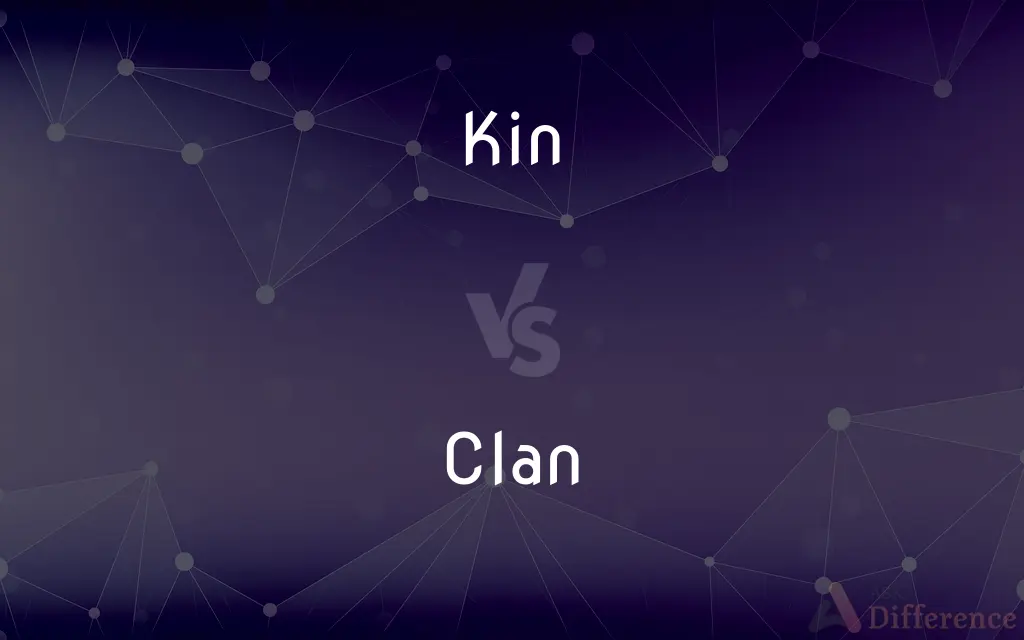Kin vs. Clan — What's the Difference?
By Tayyaba Rehman & Fiza Rafique — Published on October 17, 2023
Kin refers to one's family or relatives, while clan denotes a larger group of families with a common ancestor or shared characteristics.

Difference Between Kin and Clan
Table of Contents
ADVERTISEMENT
Key Differences
Kin is a term that encompasses one's immediate and extended family members. This includes parents, siblings, and various relatives connected by blood, marriage, or adoption. One could say that kin highlights the individual members or smaller units that make up the broader familial network.
Clan, on the other hand, designates a larger group that often consists of several families with shared lineage or ties. Historically, clans emerged as larger kinship groups that provided social, economic, and even political support to their members. In many societies, clans carried distinct identities, symbols, or totems that were recognized widely.
The distinction between kin and clan becomes particularly evident in societies with tribal affiliations. In these contexts, kin might refer to one's immediate family or household, while clan would refer to a broader affiliation within the tribe. The strength and role of clans vary across cultures, but they often serve as a way to consolidate power, resources, and identity.
In the modern age, the term "kin" still remains closely tied to the concept of family and genetic or legal ties. "Clan," while still denoting familial ties, has also been used more broadly to describe groups with shared interests, characteristics, or identities, sometimes even in virtual spaces.
Comparison Chart
Primary Definition
Family or relatives
Group of families with a common ancestor or shared characteristic
ADVERTISEMENT
Size
Typically smaller, individual or immediate family
Larger, encompassing multiple families
Historical Context
General term for relatives
Often tied to tribal affiliations or larger kinship groups
Modern Usage
Still closely related to family
Can also describe groups with shared interests or identities
Association
Direct blood, marriage, or adoption ties
Broader shared lineage or affiliations
Compare with Definitions
Kin
One's family members.
I am visiting my kin this weekend.
Clan
A large kinship group.
Several families in the village belong to the same clan.
Kin
Those related through marriage.
Through the wedding, she became kin to him.
Clan
A tribe or social group with a shared identity.
The clan's symbol was proudly displayed at the gathering.
Kin
People with a familial bond, either by birth or choice.
We may not be related by blood, but we're still kin.
Clan
A group defined by its common heritage or characteristics.
The clan of artists frequently collaborated on projects.
Kin
Descendants of a common ancestor.
They discovered they were kin after researching their genealogy.
Clan
A group of families with a shared ancestor.
The MacDonald clan traces its roots back to Scotland.
Kin
(used with a pl. verb) One's relatives or family
Visited my aunt and her kin.
Clan
A traditional social unit in the Scottish Highlands, consisting of a number of families claiming a common ancestor and following the same hereditary chieftain.
Kin
A relative or family member
Is she kin of yours?.
Clan
A division of a tribe tracing descent from a common ancestor.
Kin
(used with a pl. verb) Organisms that are genetically related to another or others
Cauliflower and its kin.
Clan
A large group of relatives, friends, or associates.
Kin
Related genetically or in the same family.
Clan
(anthropology) A group of people all descended from a common ancestor, in fact or belief, especially when the exact genealogies are not known.
Descent group
Kin
Related or similar; akin
"If he feels a wisp of longing for her ... it is kin to what the serpent must have felt for Eve" (Barbara Klein Moss).
Clan
A traditional social group of families in the Scottish Highlands having a common hereditary chieftain
Kin
Race; family; breed; kind.
Clan
Any group defined by family ties with some sort of political unity.
Kin
(collectively) Persons of the same race or family; kindred.
Clan
(video games) A group of players who habitually play on the same team in multiplayer games.
Kin
One or more relatives, such as siblings or cousins, taken collectively.
Clan
A badger colony.
Kin
Relationship; same-bloodedness or affinity; near connection or alliance, as of those having common descent.
Clan
A tribe or collection of families, united under a chieftain, regarded as having the same common ancestor, and bearing the same surname; as, the clan of Macdonald.
Kin
(fandom) A fictional character who one deeply relates to.
Clan
A clique; a sect, society, or body of persons; esp., a body of persons united by some common interest or pursuit; - sometimes used contemptuously.
Partidge and the rest of his clan may hoot me.
The whole clan of the enlightened among us.
Kin
Someone who relates deeply to a certain fictional character.
Clan
Group of people related by blood or marriage
Kin
Related by blood or marriage, akin. Generally used in "kin to".
It turns out my back-fence neighbor is kin to one of my co-workers.
Clan
A faction or group with shared interests or goals.
The gaming clan meets every Friday night for battles.
Kin
To identify with; as in empathize or emotionally relate to a fictional character.
Kin
A primitive Chinese instrument of the cittern kind, with from five to twenty-five silken strings.
Kin
Relationship, consanguinity, or affinity; connection by birth or marriage; kindred; near connection or alliance, as of those having common descent.
Kin
Relatives; persons of the same family or race.
The father, mother, and the kin beside.
You are of kin, and so a friend to their persons.
Kin
The unit velocity in the C. G. S. system - a velocity of one centimeter per second.
Kin
Of the same nature or kind; kinder.
Kin
A person having kinship with another or others;
He's kin
He's family
Kin
Group of people related by blood or marriage
Kin
Related by blood
Kin
Blood relatives.
He is kin to the family through his mother's side.
Common Curiosities
Can kin refer to in-laws?
Yes, kin can include relatives by marriage.
Does kin always refer to close family members?
No, it can also refer to distant relatives.
Can a group of gamers be considered a clan?
Yes, in modern contexts, clan can refer to groups with shared interests.
How large is a clan compared to kin?
A clan is typically larger, encompassing multiple families.
Is everyone in a clan considered kin?
Generally, yes, as they share a common lineage or affiliation.
Is a clan always about blood relations?
Not necessarily; it can be about shared interests or characteristics.
Can one belong to multiple clans?
Historically, clan affiliation was singular, but modern interpretations can be more flexible.
Is the concept of clans ancient?
Clans have historical roots, but the term is still used in modern contexts.
Can friends be considered kin?
In a non-literal sense, close friends can be considered kin by choice.
Is kinship the same as being kin?
Kinship refers to the system of family relationships, while kin are the members within it.
Is the term clan only used in specific cultures?
While its origin is specific, the term is now used more broadly across cultures.
Are clan identities always passed down through generations?
Historically, yes, but modern usage can be more flexible.
Do clans always have symbols or totems?
Often, especially historically, but not always.
Is a family name always indicative of a clan?
In some cultures, family names can indicate clan affiliations.
Are all members of a clan closely related?
Not always. Clan affiliations can span many generations.
Share Your Discovery

Previous Comparison
Judo vs. Kung Fu
Next Comparison
Reach vs. AchieveAuthor Spotlight
Written by
Tayyaba RehmanTayyaba Rehman is a distinguished writer, currently serving as a primary contributor to askdifference.com. As a researcher in semantics and etymology, Tayyaba's passion for the complexity of languages and their distinctions has found a perfect home on the platform. Tayyaba delves into the intricacies of language, distinguishing between commonly confused words and phrases, thereby providing clarity for readers worldwide.
Co-written by
Fiza RafiqueFiza Rafique is a skilled content writer at AskDifference.com, where she meticulously refines and enhances written pieces. Drawing from her vast editorial expertise, Fiza ensures clarity, accuracy, and precision in every article. Passionate about language, she continually seeks to elevate the quality of content for readers worldwide.
















































